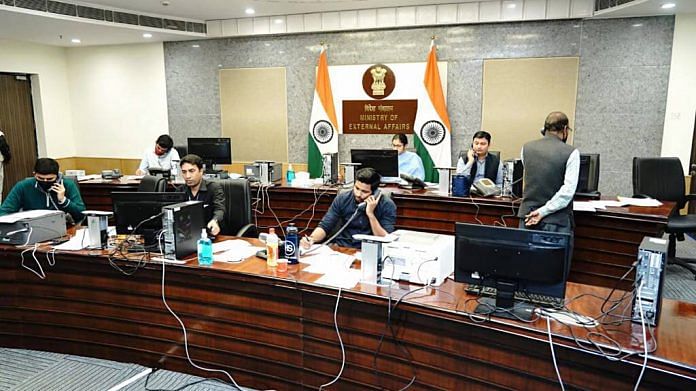New Delhi: In a report tabled in the Lok Sabha Monday, a parliamentary panel issued a sharp rebuke to the Ministry of External Affairs (MEA) on delayed implementation of a scheme intended to help distressed Indian women abroad.
In May 2021, the Ministry of Women and Child Development (WCD) announced that it would be setting up the One-Stop Centres (OSCs) scheme — aimed at supporting women affected by violence — abroad.
However, with no implementation of the scheme in nearly two years, the Parliamentary Standing Committee on External Affairs noted that the scheme is “yet to take off” and called for such centres to be opened immediately in missions where they have been approved.
“…From the reply of the Ministry it is seen that the One Stop Centre Scheme is yet to take off,” the panel said in its report.
“In view of the pivotal role likely to be played by such centres in providing timely assistance to the distressed Indian women abroad, the Committee reiterate that ‘One Stop Centres’ should be opened immediately in Missions where they have been approved and the status in this regard may be furnished to the Committee,” it added.
ThePrint contacted the MEA for a comment via text message but had not yet received a response when this report was published. The report will be updated if and when a response is received.
From 2017 to 2019, the MEA received nearly 4,000 distress complaints from married Indian women facing domestic violence and harassment abroad.
The emergence of cases such as that of Mandeep Kaur — a Sikh woman who died by suicide in New York last year after allegedly enduring eight years of domestic abuse — has led to a rising clamour for institutional mechanisms that deal with domestic abuse abroad.
Also Read: Victim or criminal? How law finds itself in knots when a battered woman kills her abuser
What is a One Stop Centre (OSC)?
The One Stop Centres (OSC) scheme was introduced in 2013, in the wake of the 2012 Nirbhaya gang rape case. The scheme was then initiated within India in March 2015.
It aims to provide women affected by violence, be it domestic violence or otherwise, access to an integrated range of services including police, medical, legal and psychological support, as well as temporary shelter.
The scheme is funded through the government’s Nirbhaya Fund, a non-lapsable corpus fund for the safety and security of women. About 700 such centres are operational in India.
In May 2021, the WCD ministry, in collaboration with the MEA, announced that it would set up OSCs in nine countries across the world — two in Saudi Arabia and one each in Bahrain, Kuwait, Oman, Qatar, UAE, Australia, Canada, and Singapore.
The initiative aims to ensure that women subjected to violence abroad can seek assistance from their own missions.
According to the parliamentary panel’s latest report, the MEA has not opened OSCs abroad despite finalising guidelines for their establishment and conveying to the missions where such centres are due to be opened in the first phase.
“Having been informed that the guidelines for establishment of ‘One Stop Centres’ for helping distressed women have been finalised and conveyed to the Missions/Posts where such centres are due to be opened, the Committee had desired for its expeditious launch,” the panel said in its report.
The report also quotes the MEA’s response to a previous committee report. The ministry had said it was preparing for the launch of the scheme, and only after that would funds be allocated to the missions where centres are to be set up.
(Edited by Rohan Manoj)
Also Read: Increased work, domestic abuse — how Covid lockdown was especially hard on women in India



